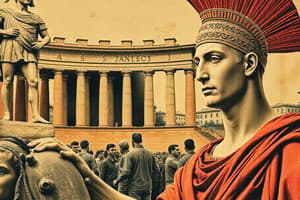Podcast
Questions and Answers
What was the consequence of Julius Caesar leading his army across the Rubicon River in defiance of the Roman Senate's orders?
What was the consequence of Julius Caesar leading his army across the Rubicon River in defiance of the Roman Senate's orders?
- The end of the Jugurthine War
- The restoration of the Roman Republic
- His proclamation as dictator (correct)
- The rise of Octavian as Augustus
What was the significance of Caesar accepting the title of 'dictator for life' in 44 BC?
What was the significance of Caesar accepting the title of 'dictator for life' in 44 BC?
- It solidified his position as a respected senator
- It sparked a civil war within Rome
- It resulted in the restoration of the Roman Republic
- It led to his assassination on the Ides of March (correct)
What historical event is associated with Caesar's crossing of the Rubicon River?
What historical event is associated with Caesar's crossing of the Rubicon River?
- The Gallic Wars
- The Punic Wars
- The Battle of Actium
- The Jugurthine War (correct)
Who were the key figures behind the conspiracy to assassinate Julius Caesar on the Ides of March?
Who were the key figures behind the conspiracy to assassinate Julius Caesar on the Ides of March?
What long-term consequence emerged from Julius Caesar's assassination on the Ides of March?
What long-term consequence emerged from Julius Caesar's assassination on the Ides of March?
How did Caesar's victory at the Battle of Pharsalus impact Rome?
How did Caesar's victory at the Battle of Pharsalus impact Rome?
What was the result of Caesar crossing the Rhine River into Germania?
What was the result of Caesar crossing the Rhine River into Germania?
What effect did Caesar's adoption of the title 'dictator for life' have on Rome?
What effect did Caesar's adoption of the title 'dictator for life' have on Rome?
How did Caesar's decisions in the Gallic Wars impact Roman territories?
How did Caesar's decisions in the Gallic Wars impact Roman territories?
What was the consequence of Julius Caesar disregarding the Roman Senate's orders to disband his army in 49 BC?
What was the consequence of Julius Caesar disregarding the Roman Senate's orders to disband his army in 49 BC?
Study Notes
Decisions and Consequences in the Life of Julius Caesar
Julius Caesar, a legendary figure from Roman history, left an indelible mark through a series of strategic decisions and their far-reaching consequences. This narrative explores pivotal moments in his life that transformed Rome and the world beyond.
Crossing the Rubicon
One of Caesar's most iconic choices was the act of leading his army across the Rubicon River in January 49 BC, defying the Roman Senate's orders to disband. This decision launched the civil war known as the "Jugurthine War," named after a previous Roman conflict that Caesar had helped to quell. Caesar's crossing ignited a chain reaction that ultimately led to his proclamation as dictator and the end of the Roman Republic as it had existed before.
The Ides of March
In 44 BC, Caesar's decision to accept the title of "dictator for life" raised suspicions and resentment among his political rivals. His assassination on March 15, the Ides of March, was the consequence of these tensions. The conspiracy, led by senators such as Brutus and Cassius, aimed to restore the Roman Republic, but the aftermath of Caesar's death was far from the intended outcome. Instead, it led to the rise of his adopted son, Octavian, later known as Augustus, who went on to found the Roman Empire.
The Gallic Wars
Caesar's Gallic Wars (58 BC – 50 BC) were a series of conflicts in Gaul (central Europe) that ultimately resulted in the expansion of the Roman Republic's territory and influence. His decision to cross the Rhine River into Germania ignited a war with the Germanic tribes, but Caesar's victories in both Gaul and Germania proved to be a catalyst for the future expansion of Roman rule.
The Alexandrian War
Following his conquest of Gaul, Caesar sought a new challenge: the subjugation of the kingdom of Egypt. His decision to engage in the Alexandrian War (48 BC) plunged Rome into a third civil war, pitting Caesar against his former ally Pompey. Caesar's victory at the Battle of Pharsalus in Greece decisively ended the war and set the stage for his triumphant return to Rome.
The Legacy of Julius Caesar
Caesar's decisions and their consequences had a profound impact on Rome and the world. His military successes brought new territories under Roman control and expanded Roman influence. At the same time, his political decisions and practices ultimately led to the end of the Roman Republic and the rise of the Roman Empire.
Caesar's legacy is vast and complex, with his decisions continuing to shape the course of history. The Roman Senate's orders for him to disband his army in 49 BC were ultimately disregarded, leading to the civil war that transformed Rome. The consequences of Caesar's adoption of the title "dictator for life" ultimately led to his assassination and the rise of Augustus as the first emperor of Rome. Similarly, his Gallic Wars expanded Roman territories and influence, while his decision to engage in the Alexandrian War brought Rome into yet another civil war.
The decisions and consequences of Julius Caesar's life serve as a testament to the power of individual choices and their far-reaching impact on the world. His legacy, both in Rome and throughout history, stands as a monument to the power of decisions and their consequences.
Studying That Suits You
Use AI to generate personalized quizzes and flashcards to suit your learning preferences.
Description
Explore pivotal moments in the life of Julius Caesar, a legendary figure from Roman history, through his strategic decisions and their profound consequences. From crossing the Rubicon to the Ides of March, delve into how Caesar's choices transformed Rome and shaped the course of history.




